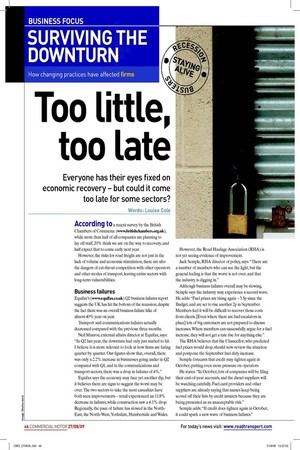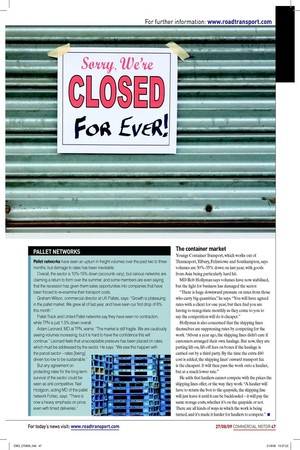BUSINESS FOCUS
Page 50

Page 51

If you've noticed an error in this article please click here to report it so we can fix it.
SURVIVING THE DOWNTURN
How changing practices have affected firms
Too little, too late
Everyone has their eyes fixed on economic recovery – but could it come too late for some sectors?
Words: Louise Cole According to a recent survey by the British Chambers of Commerce (www.britishchanbers.org.uk), while more than half of all companies are planning to lay off staff, 20% think we are on the way to recovery; and half expect that to come early next year.
However, the risks for road freight are not just in the lack of volume and economic stimulation, there are also the dangers of cut-throat competition with other operators and other modes of transport, leaving entire sectors with long-term vulnerabilities.
Business failures
Equifax’s (www.equifax.co.uk) Q2 business failures report suggests the UK has hit the bottom of the recession, despite the fact there was an overall business failure hike of almost 40% year on year.
Transport and communications failures actually decreased compared with the previous three months.
Neil Munroe, external affairs director at Equifax, says: “In Q2 last year, the downturn had only just started to hit. I believe it is more relevant to look at how irms are faring quarter by quarter. Our igures show that, overall, there was only a 2.2% increase in businesses going under in Q2 compared with Q1, and in the communications and transport sectors, there was a drop in failures of 4%.” Equifax says the economy may face yet another dip, but it believes there are signs to suggest the worst may be over. The two sectors to take the most casualties have both seen improvements – retail experienced an 11.8% decrease in failures, while construction saw a 4.1% drop. Regionally, the pace of failure has slowed in the NorthEast, the North-West, Yorkshire, Humberside and Wales. However, the Road Haulage Association (RHA) is not yet seeing evidence of improvement.
Jack Semple, RHA director of policy, says: “There are a number of members who can see the light, but the general feeling is that the worst is not over, and that the industry is digging in.” Although business failures overall may be slowing, Semple says the industry may experience a second wave. He adds: “Fuel prices are rising again – 3.5p since the Budget, and are set to rise another 2p in September. Members feel it will be dificult to recover those costs from clients. [Even where there are fuel escalators in place] lots of big customers are not prepared to discuss increases. Where members can successfully argue for a fuel increase, they will not get a rate rise for anything else.” The RHA believes that the Chancellor, who predicted fuel prices would drop, should now review the situation and postpone the September fuel duty increase.
Semple forecasts that credit may tighten again in October, putting even more pressure on operators.
He states: “In October, lots of companies will be iling their end-of-year accounts, and the diesel suppliers will be watching carefully. Fuel card providers and other suppliers are already saying that names keep being scored off their lists by credit insurers because they are being presented as an unacceptable risk.” Semple adds: “If credit does tighten again in October, it could spark a new wave of business failures.”
The container market
Youngs Container Transport, which works out of Thamesport, Tilbury, Felixstowe and Southampton, says volumes are 30%-35% down on last year, with goods from Asia being particularly hard hit.
MD Rob Hollyman says volumes have now stabilised, but the ight for business has damaged the sector.
“There is huge downward pressure on rates from those who carry big quantities,” he says. “You will have agreed rates with a client for one year, but then ind you are having to renegotiate monthly as they come to you to say the competition will do it cheaper.” Hollyman is also concerned that the shipping lines themselves are suppressing rates by competing for the work. “About a year ago, the shipping lines didn’t care if customers arranged their own haulage. But now, they are putting lift-on, lift-off fees on boxes if the haulage is carried out by a third party. By the time the extra £60 cost is added, the shipping lines’ onward transport fee is the cheapest. It will then pass the work onto a haulier, but at a much lower rate.”
He adds that hauliers cannot compete with the prices the shipping lines offer, or the way they work. “A haulier will have to return the box to the quayside, the shipping line will just leave it until it can be backloaded – it will pay the same storage costs, whether it’s on the quayside or not. There are all kinds of ways in which the work is being turned, and it’s made it harder for hauliers to compete.” ■
PALLET NETWORKS
Pallet networks have seen an upturn in freight volumes over the past two to three months, but damage to rates has been inevitable.
Overall, the sector is 10%-15% down (accounts vary), but various networks are claiming a return to form over the summer, and some members are even saying that the recession has given them sales opportunities into companies that have been forced to re-examine their transport costs.
Graham Wilson, commercial director at UK Pallets, says: “Growth is plateauing in the pallet market. We grew all of last year, and have seen our first drop of 6% this month.” Pallet-Track and United Pallet networks say they have seen no contraction, while TPN is just 1.3% down overall.
Adam Leonard, MD at TPN, warns: “The market is still fragile. We are cautiously seeing volumes increasing, but it is hard to have the confidence this will continue.” Leonard feels that unacceptable pressure has been placed on rates, which must be addressed by the sector. He says: “We saw this happen with the parcel sector – rates [being] driven too low to be sustainable.” But any agreement on protecting rates for the long-term survival of the sector could be seen as anti-competitive. Neil Hodgson, acting MD of the pallet network Fortec, says: “There is now a heavy emphasis on price, even with timed deliveries.”


























































